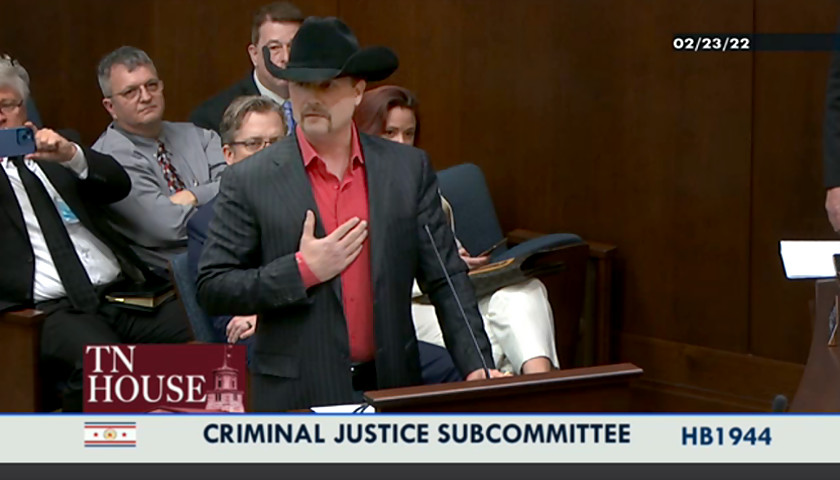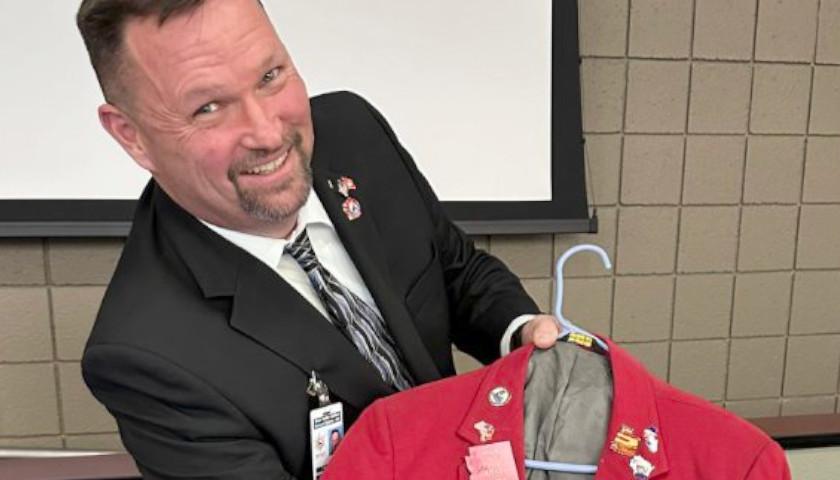Country music singer-songwriter and Nashvillian John Rich testified before the Tennessee House Criminal Justice Subcommittee Wednesday regarding legislation dealing with pornographic and obscene material in K-12 Tennessee schools.
According to the sponsor of HB1944, Representative Scott Cepicky (R-Culleoka), alluding to the turmoil expressed across the state, the bill creates a process to deal with such materials that have found their way into classrooms and libraries.
The legislation would remove the exception that exempts the K-12 system from possession of any obscene or pornographic material. The bill also creates a skeletal process, so that if a complaint is made that there is controversial material in the school system, there is assurance that books are not arbitrarily removed from a school system by using community standards and what a reasonable person would deem obscene or pornographic, a standard the Supreme Court has addressed. The final decision would rest with the local school board, who are the elected members of the community. The bill also creates a process of reporting to the state the books that are removed, and includes an enforcement mechanism at the state board of education to ensure the local school districts have enacted the process.
Subcommittee Chairman Clay Doggett (R-Pulaski) announced that there were several witnesses wishing to speak on the topic including Rich, and that they would each be limited to four minutes.
Rich had previously addressed the topic of pornography in Tennessee schools on during an event sponsored by Williams Families PAC held on November 2 at Liberty Hall, located within the Factory at Franklin. Rich performed several songs, but also brought up the pornography in schools, reading a portion of the Tennessee code he had printed out. Rich said that he had discussed it with Governor Bill Lee and would give Lee a couple of weeks to deal with the issue.
In November, Rich tweeted several times on the topic and appeared in an interview on NewsMax in January to discuss the issue.
This message is for @SchwinnTeach : The Dept of Education in the State of TN is in violation of Tennessee Code 39-17-911 and we, the citizens of TN demand that all reading material violating this statue be removed immediately from our schools. @GovBillLee @CSexton25 need to act.
— John Rich (@johnrich) November 16, 2021
Rich approached the podium in House Hearing Room II holding prepared written remarks as he introduced himself.
“I’m John Rich and I’m here in my capacity as a dad, which is my most important job.”
“There are good people in our legislature on both sides of the aisle, who want to fix the problem of our children being exposed to obscene and pornographic material at school. However, some have argued that this material is approved, because it falls into the definition of education in their opinion. I will prove to you today how that statement is false.”
Rich continued:
We are here today because our rogue schools, teachers and school boards that are allowing our children to be exposed to materials that assault their innocence and conscience every day even at this very minute. Not only is it repugnant and evil to expose our kids to graphic sexual images and narratives, it also happens to be illegal on a state and federal level. Today I’m going to focus on just one of the reasons why it has been deemed to be illegal to expose kids to these materials. That reason is an official and legally recognized term used to define the tactics of child predators when they are in pursuit of a child. It is known as “grooming.”
The American Bar Association outlines grooming tactics predators may use during the grooming process to include: Number one, discussing sexually explicit information under the guise of education. American Bar Association. Number two, showing the child sexually explicit images or narratives. Under the federal Coroners and Justice Act of 2009 Section 62 through Section 68, it was made a criminal offense to be in possession of prohibited images of children including cartoons, drawings or computer-generated images. This is defined closely to require that the image is grossly offensive and obscene and pornographic.
The two main justifications given by the federal government for criminalizing the possession of these prohibited images was that they could be used for grooming children and could fuel child abuse by reinforcing potential abusers’ inappropriate feelings towards the children.
The federal enticement statute section of 2422 of the United States Criminal Code, the statute targets the sexual grooming of minors. The statute’s focus is on the intended effect on the minor, rather than the defendant’s intent to engage in sexual activity.
In the case of the United States vs. Chambers, defendant Chambers was convicted of violating the federal enticement statute. The Seventh Circuit Court of Appeals noted that child sexual abuse can be accomplished by several means and is often carried out through a period of grooming. The court recognized that grooming refers to deliberate actions taken by a defendant to expose a child to sexual material and that the ultimate goal of grooming is reduce the child’s inhibitions, to prepare the child for sexual activity.
Furthermore, U.S. Criminal Code 1466A it states, in general, any person who knowingly produces, distributes, receives or possesses with intent to distribute, a visual depiction of any kind, including a drawing, cartoon, sculpture or painting that depicts a minor engaging in sex or is obscene shall be subject to the felony penalties provided in Section 2252A.
“Note it is not a required element under this section that the minor depiction actually exists” Rich said, looking up at the legislators for emphasis, “or is a real person.”
Putting his prepared remarks down, Rich looked at the legislators and used his hands for emphasis as he continued.
“What’s the difference between a teacher or an educator or a librarian putting one of these books, like you have,” he said, pointing “on the desk of a student or a guy in a white van pulling up at the edge of school when school lets out and saying, ‘Come on around kids, let me read you this book and show you these pictures?’”
“What’s the difference in those two scenarios?”
“There is a difference, by the way.”
“They can run away from the guy in the white van,” Rich responded rhetorically, accompanied by head nods from observers sitting directly behind him, including Maury County Mayor Andy Ogles, Americans for Prosperity-Tennessee State Director Tori Venable and Pastor Dale Walker, among others.
“Does anyone here have kids or grandkids?” Rich asked, raising his hand along with others. “I’m assuming most do.”
“Can you imagine if your kids or grandkids came to my home and I pulled out some of these books and I read them those stories and I showed them those pictures and they came back to your house?” asked Rich as he played out the scenario.
“‘You’re not going to believe what Mr. John read to me and showed me over at his house.’”
“‘What’d Mr. John show you?’”
“And I get a phone call,” imitating holding a phone, “‘Hey, I want to see what you showed my kid.’”
“And I show them that – what do you think would happen to me at that point?”
Once again, responding rhetorically, Rich said, “I’d be arrested, and as I should be arrested.”
“I’ve heard of processes that are in place to handle this. Yeah, processes without penalty,” Rich emphasized. “Processes without penalty aren’t enforceable, and that’s why nothing’s happening right now.”
Going back to reading his remarks, Rich continued, “Individuals and entities that decide it’s okay to assault our children with pornographic images and story lines – I would bet that no one in this chamber wants to be on the record for allowing bona fide grooming to continue taking place in Tennessee schools. I’d bet on that one.”
“I’d guess that no one wants to be known as someone standing in the way of legislation being passed that protects the innocent among us – our children – from being victimized by these illegal actions.”
“Governor Lee’s language does not fix the problem,” Rich stated definitively.
“It says that teachers, board and administrators can still determine what is age-appropriate or not.”
“The reason we have a problem in the first place is because these teachers, boards and administrators already think the materials are age-appropriate.”
“In effect, the current language as it was proposed and has been proposed holds no one any more accountable than they are today,” tapping on the podium to the two-syllable word, “and leaves the parents with the only option they currently have, and that is to file civil and criminal charges against the perpetrators.”
At that point, Chairman Doggett advised that Rich had gone over the four-minute time limit, to which Rich responded by ending with a biblical warning.
“I’ve got one more thing to say, please: Matthew 18:6, ‘But if anyone causes one of these little ones who believe in Me to stumble, it would be better to have a millstone hung around his neck and be drowned in the depths of the sea.’ That’s it,” Rich concluded, dramatically dropping his papers on the podium to cheers and applause.
Doggett thanked Rich and said he thought Republican Majority Leader William Lamberth was going to request to give him some more time to speak.
Representative G. A. Hardaway (D-Memphis) indicated that he had a question for Rich and, after thanking Rich for his involvement, he respectfully disagreed with Rich’s example of “the pervert or pedophile pulling up outside of the school versus material that’s made available in the library that would be open to interpretation either way by a child.”
“I’m not supporting putting porno or extreme obscene material in the hands of children unsupervised and without the benefit of a responsible adult assisting in the interpretation of the same. In other words, critical thinking. Critical thinking. That’s what our children are in school for, and critical thinking sometimes requires exposure to information that you may not necessarily agree with, opinions you may not necessarily agree with, and I use that as an example but in no way am I endorsing any of the specific material that you cited. I don’t know those books. I haven’t read them.”
When Rich said Hardaway should, Hardaway responded, “No, sir, I don’t have to,” explaining that he doesn’t have to be able to see the porno in order to know it. “I will read what I deem is necessary for me.”
Hardaway wanted to make it clear he wasn’t discussing those books, but is concerned that sensationalizing critical thinking will undermine the whole purpose of public education and asked Rich if he had a response to the efforts of schools instilling critical thinking skills in the children.
To Hardaway’s first comment, Rich said, “If it’s perverted for a pervert to say it to the kids on the edge of school, then it’s perverted to say it in the classroom.”
After a noticeably long pause, Hardaway replied, “I don’t even know what you’re responding to. If you’d be kind enough to respond to the question I asked.”
“That was a comment on your first comment,” Rich said, after there was some talking over each other.
“Yeah, I think critical thinking is absolutely critical. That’s why we’re all standing in this room to discuss if this is something we want our kids being exposed to or not. I guess the only way you could make a case for critical thinking to put what I would consider pedophilic material in front of children would be to teach the kids, ‘Hey if anybody ever reads a story like this to you or shows you a picture like that, call the police.’ That would be critical thinking,” to more enthusiastic applause and cheers.
Hardaway, thanking Chairman Doggett for gaveling to restore order, continued, “I’m going to try to keep this focused, once again, Mr. Rich, on the principles and the skills that we want our children to learn in education. But if all that you’re going to do is sensationalize it by getting back onto pedophile issues and porno and obscenity, then we’re not going to have a fair exchange of ideas. My concern is that we go too far in restricting our educators and their ability to instill in our children critical thinking skills and that’s what I was asking you to respond to. How do we balance the protections for our children against what the community would label as obscenity and pornographic material against critical thinking skills?”
“Right,” Rich responded before continuing. “I think, I think what’s interesting about this is that the books that have everybody so upset that do contain obscene material and pornographic material, those have already been deemed illegal in our state. They’ve been deemed illegal in the United States. I’ve cited case after case in law about that. What we’re asking for are some type, in this new legislation,” partially turning toward Cepicky, “some type of teeth in this that not only is there a process in place to get the books out, but if you knowingly are harboring material like that that is in violation of our current [statutes] in the state of Tennessee and federal, there should be some type of penalty. Procedure without penalty cannot be enforced. You know, if that was the case in driving too fast, they would say, ‘Hey, slow down!’ every single time, right? But, they don’t say that. They give you a ticket at some point. You do it enough, they take your driver’s license away.
“There is no penalty in place to deal with this and because of the exception that he noted,” gesturing toward Cepicky, “that is currently on the books that allows this under the guise of ‘education,’” with air-finger quotes, “if you remember in the beginning of what I said, that even the American Bar Association says part of grooming is to show kids these types of images and narratives under the guise of education.”
“This has been addressed in places all the way at the top of the food chain in our country, over and over and over. It’s established what that is. I believe that people have hijacked the law. I believe they’ve hijacked the elbow room they were given to have critical thinking. I absolutely believe in critical thinking, in teaching our kids to think critically. But I believe they’ve hijacked it, they’ve manipulated it, and they have gone outside the lines of what it was originally intended to be for. And, as a cause of that, our children are being hurt,” Rich concluded.
“Thank you, Mr. Rich,” said Hardaway. “We’re back on a rational discussion now, and I appreciate having you back. The opportunities for our children to learn these skills and the opportunities for our educators to instill these skills is what I’m most concerned about impugning. If we’re going to be applying a blanket description and application on this material and the description is just so loose and criminalization of librarians is concerning to me. I think there’s a balance that we have to find, and I’m sure the sponsor shares my concern about having balance in education,” Hardaway concluded out of respect for the time.
Angela Redden, an independent bookstore owner in Dickson for the past three years whom Representative Michael Curcio (R-Dickson) said he has known his entire life, previously spent 17 years as a teacher in Tennessee. On behalf of her former colleagues, Redden urged the committee members to vote against the legislation, citing what she said is a clear violation of the First Amendment and that under existing Tennessee code it is already illegal to distribute materials harmful to minors. Redden warned of censorship and subversion of the intended use of the bill.
Upon questioning by Hardaway, Redden said that what is considered obscenity would be different for a child living in a home with a single parent surrounded by drugs and violence is totally different from a child that hasn’t suffered the breakdown of a family, and that the ability to make those decisions should not be taken away from teachers trained to make it. Yet, moments earlier, Redden also expressed concern that the legislation would allow each of the 31 judicial districts do have an individual definition of obscenity.
As Redden was being relieved from the podium, Representative Jerry Sexton (R-Bean Station), indicated he wanted to speak to the witness.
“I’m not an educator. I’ve never been involved in education, even though I was on the Education Committee for a couple years. So, there’s a lot in education I don’t know about. I do know about raising a family, and I do know about how important it is, words mean a lot. Literature means a lot. And I think the protection of our children is very important,” Sexton began.
“You made a statement, and I do not mean this with any disrespect to you, but you said you talked about trusting you and trusting teachers. And just recently I looked at some of the literature, and I’m appalled. And if you’re allowing,” Sexton said, as he held up with obvious disgust a softcover version of Me and Earl and the Dying Girl, “or any teacher or any librarian is allowing stuff like this in, no I do not trust you. I do not trust the teachers,” Sexton deliberately stated as he set the book down and the chairman gaveled the applause.
After a somewhat heated exchange, Sexton told Redden, “Pornography like this,” again holding up the book he said was available to fifth-grade students, “does not belong in our schools, period. It doesn’t belong in high school. It doesn’t belong in elementary school. When you’re talking about private acts that are going on with teenagers and graphics and, in some cases, they even have photos showing you how to do it,” concluding by setting down the book.
A mom of two daughters who attend Williamson County Schools, Kristin Benton, testified that last year she began hearing about pornographic materials in schools across the country and began researching books that meet the definition of Title 39 obscenity in the Tennessee code. When she found that title after title kept showing up in the school libraries, Benton said she was in shock.
“How could our schools, in good conscience, be okay with this?” Benton wondered.
Benton realized that there were only two possible answers to that question. “Either they don’t know, or they don’t care.
Assuming innocent intent, Benton was one of six parents who went to the November meeting of the Williamson County Schools board meeting and read excerpts from books found in multiple libraries in the county and across the state.
“What we read was deemed so obscene that they muted the live feed online so that those watching at home could not hear what we read,” relayed Benton.
After the board meeting, Benton said she was optimistic that with the board members now aware that the materials are obscene enough to mute the live, relate that to their 15- or 16-year-old selves and take quick action to remove the books.
“Not so. It’s been 3 months and the district has made no effort to investigate the book titles that I provided them, and further said that parents must pursue a very tedious and very lengthy 4403 textbook review process for the opportunity to have titles in libraries reviewed,” Benton advised.
Since they are library books, the problem, Benton contends, could be solved with a simple email to the district’s librarians. “But they’re taking no responsibility or initiative to protect our children.”
Benton emphasized that’s why HB1944 is so important.
“This is why HB1944 is so important. You have the opportunity to place guardrails that protect our children in the setting where parents most trust them to be safe and protected – their school. You have the opportunity to prevent and hold schools accountable for breaking the laws that protect the most innocent and precious among our population – our children.”
“On behalf of the parents of the children across this great state of Tennessee, I ask you to please vote yes on HB1944,” Benton concluded to applause.
Rep. Bill Beck (D-Nashville), acknowledging that Benton is talking about books, asked what is being done about the pornography that is accessible on cellphones, as he held his up to demonstrate his point.
“The issue is what’s in the school libraries and what the schools are providing to children. The school is not responsible for what parents at home are doing. Parents get to make the choice for their children at home. But, in the schools, the government essentially has access to our children, the government should be taking measures, putting guardrails in place to keep our children safe and protected,” Benton responded.
Hardaway questioned Benton as to whether with this bill there will remain exceptions for the material that is deemed to have value, scientific or otherwise. Benton said there are millions of books that have education value that don’t contain obscenity. “Those books are absolutely, perfectly wonderful to use and it makes no rational sense to me that we would provide obscene materials in an educational setting when there’s no other education value present in those books.”
She also said that the books could be available in the public libraries, where she had the ability to choose what books her children check out, where she doesn’t have the same oversight in the school setting. Hardaway ventured to suggest to Benton that some children don’t have the opportunity to access public libraries for a variety of reasons and that the school library may be the only one some children or parents have access to.
After nearly 50 minutes of testimony, discussion and questions and answers, Cepicky acknowledged that more discussion was needed on the bill and asked to roll it one week and be placed first on the agenda.
The video of the House Criminal Justice Subcommittee meeting held Wednesday, February 23, can be viewed here, with the discussion on HB1944 beginning at the 1:41hr mark. John Rich’s remarks begin at about 2:12hr.
– – –
Laura Baigert is a senior reporter at The Star News Network, where she covers stories for The Tennessee Star and The Georgia Star News.









[…] month, Rich testified on the same bill before the House Criminal Justice Committee, The Star reported, and has been an outspoken critic on social media regarding the obscene and pornographic materials […]
I am so confused. If there are State and Federal laws against the materials being discussed what prevents law enforcement from taking these materials regardless of where they are located? I did not read of any restrictions on where these materials may be seized.
Sounds like all that needs to be done is enforcement. I agree there should be consequences for those breaking the law.
I would rather have a child exposed to pornography than any drivel spewed forth by the odious American Bar Association, which, mercifully, only boasts 14.4% of licensed attorneys in our country as dues-paying members.
Citing the American Bar Association as a source for anything but moral bankruptcy carries as much evidentiary weight as citing something one reads in People Magazine.
His kids go to a private school. Imagine the state telling a private school that it can’t teach about virgin births, the great flood destroying the dinosaurs, magic beanstalks or other fictional beliefs.
Jim – And your point about public schools pushing pornography is?
Thanks for the solid reporting, Laura. It exposes the leftist view of child abuse via our public school system which is dysfunctional for many reasons.
That Hardaway is a representative of the people of Memphis makes me wonder about their “critical thinking.” He blithely infers that porno is ok for children if it’s supervised by a responsible adult who interprets it for them! Who determines who’s a responsible adult or not? Another bureaucrat? Who determines what the “interpretation” of the porno is?
And then he makes sexualizing the children a part of understanding critical thought. What a perfect defense for the pedo sex groomers. Finally he admits he hasn’t seen the material that the parents are criticizing and defiantly says he doesn’t have to because it’s not necessary for him. Hardaway’s righteous ignorance is certainly not our bliss. He’s a pitiful example of what he calls a critical thought process!
“I’m not supporting putting porno or extreme obscene material in the hands of children unsupervised and without the benefit of a responsible adult assisting in the interpretation of the same. In other words, critical thinking. Critical thinking. That’s what our children are in school for, and critical thinking sometimes requires exposure to information that you may not necessarily agree with, opinions you may not necessarily agree with, and I use that as an example but in no way am I endorsing any of the specific material that you cited. I don’t know those books. I haven’t read them.”
When Rich said Hardaway should, Hardaway responded, “No, sir, I don’t have to,” explaining that he doesn’t have to be able to see the porno in order to know it. “I will read what I deem is necessary for me.”